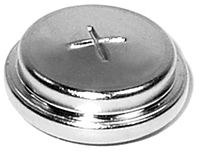
Mercury was discontinued from regular alkaline batteries in 1996. Mercury is still used in button cell batteries in the types listed below. Do not place button cell batteries in the regular trash. It is recommended, to place the spent batteries in a sealed childproof container out of reach of children. Batteries are known to be a choking hazard. Contact your local municipality or solid waste district for guidance on disposal of all types of batteries, which some may be considered hazardous for reasons other than mercury content.
The information provided below will:
- Identify the types of button cell batteries that contain mercury,
- Identify mercury-free alternatives if available, and
- Provide information on proper disposal of mercury-containing button cell batteries.
Identifying Button Cell Batteries that Contain Mercury
The following types of button cell batteries contain mercury:
- Alkaline Manganese
- Mercuric-oxide
- Silver Oxide
- Zinc-air
Button cell batteries are typically used in items such as:
- Bicycle Odometers and Speedometers
- Calculators
- Digital Thermometers
- Hearing Aids
- Pace Makers
- Some Children’s Toys and Games
- Watches
Alternatives Available
At this time, there are no button cell batteries sold in the United States that do not contain at least some amount of mercury. There are, however, several solar and alternatively-powered alternatives for most of these items (for example, solar and kinetic-powered watches).
Disposal Information
Households
Households should dispose of button cell batteries at local household hazardous waste collection events sponsored by their local municipality or solid waste district.
Commercial and Institutional
The following disposal options are available to commercial/institutional generators of button cell batteries:
- Small businesses may be able to dispose of button cell batteries and other mercury-containing devices at town or solid waste district collection events.
- Direct shipment as “Universal Waste” to a mercury recycling facility.
- Shipment through a hazardous waste transporter to a proper destination facility.
